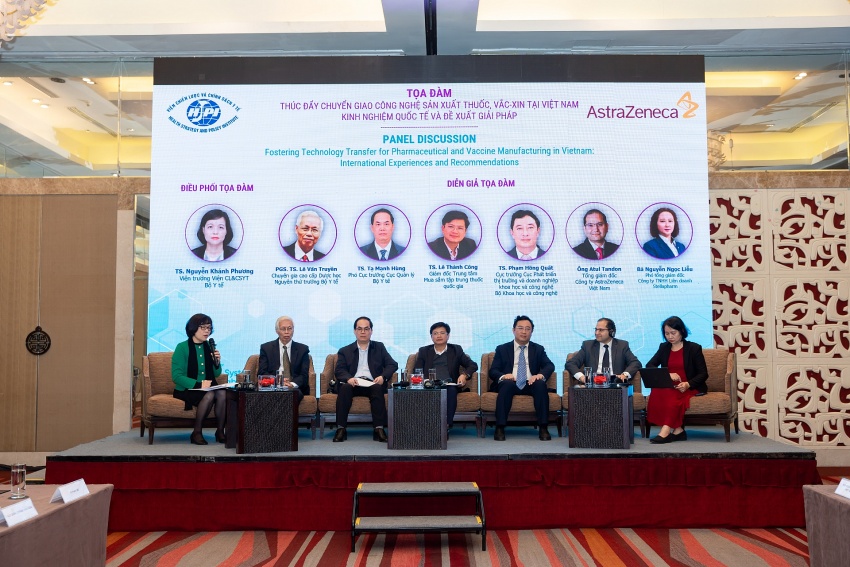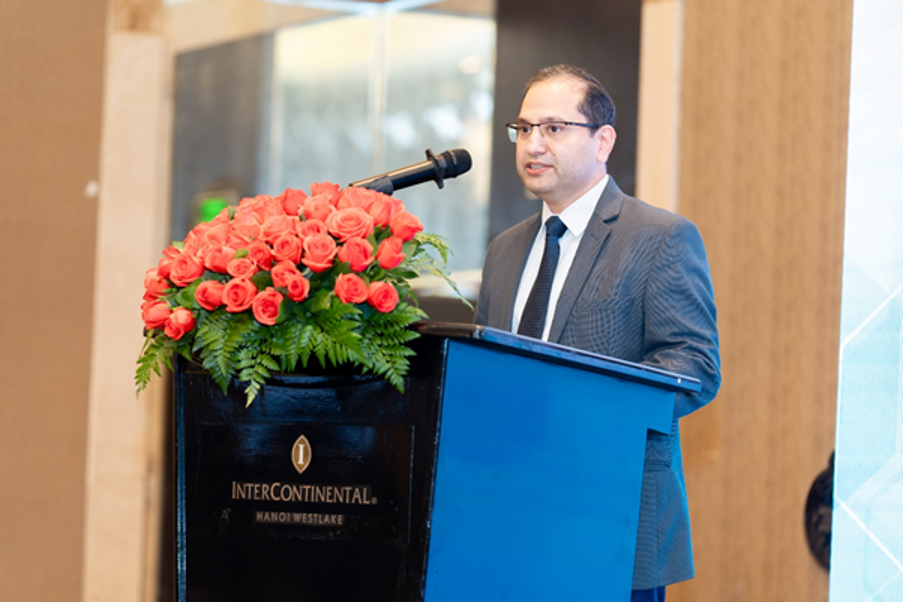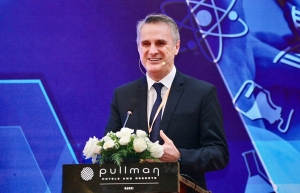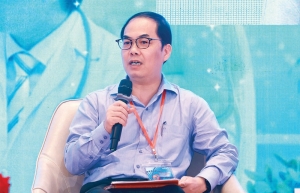Promoting technology transfer for drug and vaccine production in Vietnam
The conference was part of the Partnership for Health System Sustainability and Resilience (PHSSR) programme, a collaboration between HSPI and AstraZeneca Vietnam.
 |
| Policymakers, experts, and businesses gathered at the conference to discuss technology transfer in the pharma industry. Photo: Bich Thuy |
The conference attracted leaders of various departments and agencies under the Ministry of Health, the Ministry of Science and Technology, and Vietnam Social Security, as well as representatives from universities, research institutes, the Vietnam Chamber of Commerce and Industry, pharmaceutical industry associations, and domestic and international pharmaceutical companies.
The conference highlighted the pivotal role of technology transfer in drug and vaccine production, evaluated the current status, opportunities, and challenges in Vietnam, and shared international success stories. Based on these discussions, policies were proposed to enhance technology transfer in Vietnam.
Addressing the event, Ta Manh Hung, deputy head of the Drug Administration of Vietnam, emphasised, "This conference is both timely and relevant, particularly as the Ministry of Health is drafting legal documents to guide the implementation of amendments to the Law on Pharmacy recently approved by the National Assembly. These amendments include groundbreaking policies aimed at promoting technology transfer and advancing the domestic pharmaceutical industry. With concerted efforts from the government, businesses, research institutes, and other stakeholders, the goal of establishing Vietnam as a centre for high-value pharmaceutical production and technology transfer within ASEAN is entirely achievable."
The national strategy for the pharmaceutical Industry sets ambitious goals for Vietnam to become a regional hub for original drug technology transfer within ASEAN. By 2030, domestically produced medicines will account for 80% of the volume and 70 per cent of the market value, alongside technology transfer for at least 100 original drugs, vaccines, and biologics.
Experts at the event agreed that technology transfer is a key driver for the development of Vietnam's pharmaceutical industry and provides comprehensive economic and social benefits, contributing to the nation's sustainable development goals. Specifically, it enhances the manufacturing capacity of the pharmaceutical industry, enabling Vietnam to achieve its strategic objectives.
Technology transfer also facilitates access to modern technology, reduces research and development costs, and enables the production of high-tech medicines, ensuring health security and supply autonomy. Moreover, it strengthens the competitiveness of the pharmaceutical sector, attracts international investment, and expands export potential, thereby affirming Vietnam's position in the regional market.
Additionally, it fosters the development of high-quality human resources, mastery of advanced technologies, and long-term innovation capabilities. For society, technology transfer enables affordable access to medicines, reduces treatment costs, and improves healthcare quality. The growth of the pharmaceutical industry contributes to GDP, tax revenues, trade balance, and job creation, while enhancing technological capabilities and attracting foreign investment for sustainable socioeconomic development.
Dr. Nguyen Khanh Phuong, director of the HSPI, added, "International experience demonstrates that the success of technology transfer depends heavily on government support, including favourable policies, investment incentives, intellectual property protection, and infrastructure support. Creating an attractive environment for multinational corporations to invest in technology transfer projects is critical."
 |
| Atul Tandon, general director of AstraZeneca Vietnam. Photo: BT |
Atul Tandon, general director of AstraZeneca Vietnam, stated, "The journey of technology transfer in the pharmaceutical sector, which AstraZeneca and our partners are integrating, is complex and fraught with risks and challenges. Looking ahead, we hope to continue collaborating with the Vietnamese government and stakeholders to achieve our shared objectives in cross-border technology transfer. With cooperation across various sectors of society, we can effectively overcome these challenges, ensuring our efforts align with Vietnam's healthcare priorities and ultimately benefit the Vietnamese people."
To effectively promote technology transfer, experts recommended that Vietnam must establish and harmonise related policies. Priority measures include comprehensive incentives throughout the technology transfer process, refinement of intellectual property regulations to protect the rights of both transferors and transferees, and the issuance of detailed guidelines to implement existing incentives.
These include measures such as price controls, procurement and bidding policies, tax incentives like corporate income tax reductions, exemptions for imported raw materials, and land rent reductions. Additionally, financial support from scientific research and investment funds is crucial. Addressing implementation challenges, such as rationalising price negotiations and ensuring timely licensing of medicines, is essential. Investments in workforce training and capacity-building in the pharmaceutical industry are pivotal for mastering technology. Finally, monitoring and evaluating policy implementation will ensure effectiveness and lay the foundation for the sustainable development of Vietnam's pharmaceutical industry.
 | Dreaming big for the Vietnamese pharma industry Vietnam has prioritized advancing its pharmaceutical industry, with a particular focus on developing a domestic generic industry to meet the demands of its citizens. |
 | Opportunities abound for innovative pharma industry Countries around the world are hoping to entice investment for their innovative pharmaceutical industries in order to bring sociometric benefits towards sustainable development strategies. Emin Turan, chairman of Pharma Group, talked to VIR's Bich Thuy about the specific opportunities for Vietnam in this regard. |
 | Incentives ahead for pharma industry Vietnam's pharmaceutical industry has reached level three under the World Health Organization's classification, as the country can now produce some basic raw materials. However, it has yet to fully develop raw material production, as it cannot compete with imported materials. |
What the stars mean:
★ Poor ★ ★ Promising ★★★ Good ★★★★ Very good ★★★★★ Exceptional
Themes: Healthcare Platform
- PM outlines new tasks for healthcare sector
- Opella and Long Chau join forces to enhance digestive and bone health
- Hanoi intensifies airport monitoring amid Nipah disease risks
- Cosmetics rules set for overhaul under draft decree
- Policy obstacles being addressed in drug licensing and renewal
Related Contents
Latest News
More News
- PM outlines new tasks for healthcare sector (February 25, 2026 | 16:00)
- Myriad risks ahead, but ones Vietnam can confront (February 20, 2026 | 15:02)
- Vietnam making the leap into AI and semiconductors (February 20, 2026 | 09:37)
- Funding must be activated for semiconductor success (February 20, 2026 | 09:20)
- Resilience as new benchmark for smarter infrastructure (February 19, 2026 | 20:35)
- A golden time to shine within ASEAN (February 19, 2026 | 20:22)
- Vietnam’s pivotal year for advancing sustainability (February 19, 2026 | 08:44)
- Strengthening the core role of industry and trade (February 19, 2026 | 08:35)
- Future orientations for healthcare improvements (February 19, 2026 | 08:29)
- Infrastructure orientations suitable for a new chapter (February 19, 2026 | 08:15)

 Tag:
Tag:






















 Mobile Version
Mobile Version